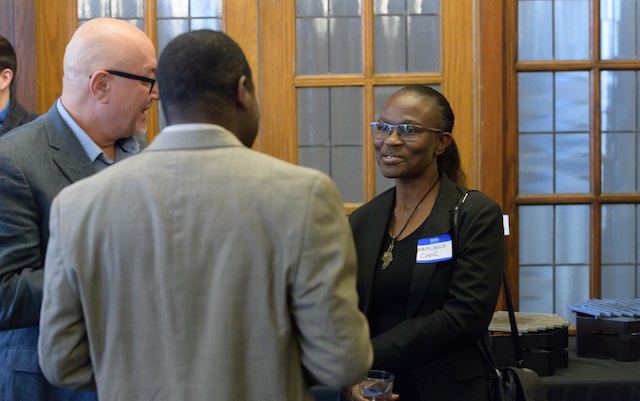Leading figures in the global fight against hunger gathered at Purdue University April 10-11 for a colloquium to exchange ideas on forging a new pathway towards eliminating world hunger and achieving the ideal of every person’s human right to a healthy, nutritious diet. Borrowing from Purdue graduate Neil Armstrong’s famous remark upon setting foot on the moon—“One small step for man, one giant leap for mankind”—the theme was, “A giant leap forward toward ending global hunger.”
IFPRI Director General Shenggen Fan and I participated in the event, held in conjunction with Purdue’s 150th anniversary observation, by sharing insights from IFPRI research in a keynote speech and plenary presentation, respectively.
In his speech, titled “Getting Policy, Politics, and Governance Right,” Fan emphasized the need for innovative approaches to policies that promote nutritious, sustainable and healthy diets. Reforms are also needed to move away from ineffective, unsustainable policies, such as agricultural subsidies, which distort prices and contribute to a lack of sustainability.
Fan acknowledged the European Union’s positive direction in eliminating agricultural subsidies as a promising example. He also highlighted the importance of policy analysis and data as tools to support and inform the needed governance on agriculture and nutrition, while taking into account the political economy in a given context.
My presentation, “Challenges and Opportunities to Improving Human Nutrition and Health,” focused recent work in Africa by the CGIAR Research Program on Agriculture for Nutrition and Health (A4NH) and the Transform Nutrition West Africa project. I encouraged researchers to collaborate with the Comprehensive Africa Agriculture Development Programme (CAADP) both at the national and continental levels, and the Scaling-Up-Nutrition (SUN) movement.
Many African countries are working with these programs to accelerate progress on agriculture and nutrition and linking to them can promote the possibility of making a giant leap towards better nutrition and health outcomes on the continent. I addressed the fact that although countries like the United States have had food-based dietary guidelines for many years, nutrition and health outcomes with respect to overweight and obesity have not been positive. Many African countries that are only now developing their food-based dietary guidelines can learn lessons on why this is the case—providing an opportunity to chart a different direction.
Purdue University is extensively engaged in agricultural research both in the U.S. and in many developing countries where IFPRI and A4NH target their work. The university will use the colloquium discussions to chart a new pathway for its contribution to the fight against hunger and malnutrition through research. Purdue trains about 5,000 international postgraduate students in different disciplines on agriculture, food science, and nutrition, many from Africa, Asia, and Latin America.
Namukolo Covic is a Senior Research Coordinator with IFPRI on the CGIAR Research Program on Agriculture for Nutrition and Health (A4NH), based in Addis Ababa, Ethiopia. This post also appears on the A4NH blog.







